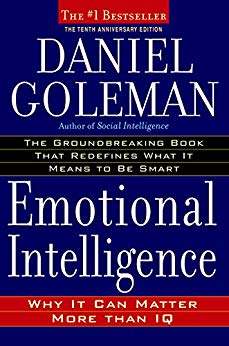

This article is an excerpt from the Shortform summary of "Emotional Intelligence" by Daniel Goleman. Shortform has the world's best summaries of books you should be reading.
Like this article? Sign up for a free trial here .
Want to become more empathetic, and learn to recognize other people’s feelings and emotions? Learn how to feel more empathy here.
Empathy is a fundamental people skill, allowing us to interpret what others want or need. This skill is especially important in what Goleman refers to as the “caring professions,” such as sales, management, or teaching.
What Empathy Is—and Why Lacking It Is Bad
How well you identify your own and others’ emotions ultimately makes you a better person. Empathy is the root of altruism–people who can’t sense or understand another person’s needs or anguish ultimately don’t care what happens to that other person. Empathy changes the way you look at the world: when other people are in pain, you work to understand their pain and help them through it. You also work not to cause people pain: this is where morals and morality begin.
The lower someone’s capacity for empathy, the less likely they are to identify with suffering that they cannot understand, the more likely they do not view that suffering as a moral question.
- (Shortform note: An example of this can be found in some statements on sexual assault. Some male politicians have said, “We wouldn’t want that to happen to our wives, daughters, sisters, or mothers.” Instead of viewing sexual assault as a morally bad thing to happen to anybody under any circumstances, this statement only understands the suffering through direct personal relationship–it’s a more limited display of empathy.)
An absence of empathy is incredibly telling: it’s a unifying factor among many troubled people in society, such as criminal psychopaths, rapists, and molestors.
- This is not a direct correlation. An absence of empathy does not guarantee that someone will become a child molestor–but child molestors routinely demonstrate an absence of empathy.
- Criminals, specifically those who commit their crimes against other people, are usually incapable of empathy. Instead, they usually tell themselves lies that encourage or justify their crimes.
- An emotional cycle perpetuates these crimes. The perpetrators become wrapped up in their own emotional needs and do not register their victims’ feelings, viewing them instead through a lens where they either cooperate with the acts or deserve them, which sparks the perpetrators’ emotions again.
- When offenders who’ve committed these crimes are put through empathy rehabilitation, they learn to put themselves in the shoes of their victims–this essentially robs them of their ability to fantasize that the victims aren’t suffering.
How to Be More Empathetic
The culmination of all the previous skills combined, when we recognize our own emotions, manage them, motivate ourselves to do better, and can empathize with others, our personal relationships are bound to improve. Managing someone else’s emotions is the key to successful relationships.
As children, we imitate others’ emotions, and this tendency never really leaves us–we do it throughout our lives. Emotions are contagious. Whoever’s mood is stronger or whoever expresses their mood more forcefully will win out. This is called entrainment.
- You might be in a good mood at work, but if you get home and your partner’s in a horrible mood, whoever’s mood is stronger will start to sway the other one to their side.
- Good public speakers do this: they sway the emotions of the crowd by demonstrating their own emotions.
How in tune our emotions are with someone else’s can also speak to how close we are to that person–the stronger the emotional connection we feel with someone, the more tightly we will mirror their physical movements and emotional moods when we’re with them.
Social ineptitude is an inability to interact successfully with one’s peers. It usually begins in childhood, and without learning emotional intelligence habits, socially inept children will find themselves trapped in a cycle that can last into adulthood.
- Think of children playing at recess. One child wants to join in the play. The socially adept way of joining is to watch the group for awhile, join tentatively, and play by the existing rules, references, and routine. Someone who does this will be accepted into the group, and then the more they play together, the more the newcomer can start to do things like question the rules or suggest changes.
- A socially inept child will push their way into groups without knowing what’s going on and often reject the given circumstances of the group play: they’ll change subjects abruptly or pressure others to follow their new rules. This leads to the group ignoring them or rejecting them, which deprives them of their ability to learn how to play together.
Interpersonal intelligence, or the ability to manage relationships, breaks down into 4 distinct and separate abilities:
- Organizing groups. An essential skill for leaders, this is the ability to initiate and coordinate the energy and efforts of a group of people. Theatre directors, producers, military officers, and heads of organizations must possess this skill to be successful.
- Negotiating solutions. This skill involves avoiding conflicts or resolving ones that arise–it’s the mediator skill. Successful diplomats, lawyers, middlemen, and management have this skill.
- Personal connection. Empathizing and connecting are the heart of this skill. People with this skill make excellent salespeople, managers, or teachers, and are usually good team players in both business and personal relationships.
- Social analysis. Slightly different from the last one, this skill involves easily detecting and intuiting the emotions, motivations, and concerns of other people. Therapists or counselors and even novelists and entertainment writers possess this skill.
———End of Preview———

Like what you just read? Read the rest of the world's best summary of Daniel Coleman's "Emotional Intelligence: Why It Can Matter More than IQ" at Shortform . Learn the book's critical concepts in 20 minutes or less .
Here's what you'll find in our full Emotional Intelligence summary :
- What are emotions? Why do we have them?
- What is emotional intelligence? Why is it important?
- How do you manage your own emotions? Anger, anxiety, and sadness?
- How can you approach your relationships with more emotional intelligence?
- How can you teach your children emotional intelligence?
- How can emotional intelligence boost your career?






